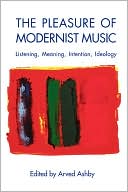

 |

|

The average rating for The Pleasure Of Modernist Music based on 2 reviews is 4 stars.
Review # 1 was written on 2020-07-13 00:00:00 Emily Mojica Emily MojicaInformative and in depth analysis of modernist music, although not for the newly acquainted with modernism. |
Review # 2 was written on 2010-10-05 00:00:00 Sean Poole Sean PooleIf you like modernist classical music, you may be baffled by the claims of some musical conservatives that serialism or Schoenberg's free atonality are just so much noise. Even entire books have been dedicated to castigating the pieces I and my peers enjoy greatly, like Henry Pleasant's dodgy classic THE AGONY OF MODERN MUSIC. But in defense of "20th century music with a popularity problem" comes THE PLEASURE OF MODERNIST MUSIC: Listening, Meaning, Intention, Ideology, edited by Arved Ashby. It collects 15 papers which discuss how modernist music can be a fun/touching/moving/thought-provoking experience. I didn't read all the papers here, so I'll just comment on a few. Greg Sandow contributes two papers where he feels that excessive analysis gets in the way of just enjoying the music. Even Milton Babbit is great fun, he claims, if you just get past the dry programme notes. William Bolcom hopes that we're finally past the stage where we either have to strive for newness at all costs or trash mid-century modernism -- let's just enjoy what we like. Richard Toop's "Informal Reflections on Simple Information and Listening" tries to undo some of the hyperbole around modern composition by noting that so much of the structure remains intelligible if one just pays attention. Even if the peculiars of twelve-tone rows pass by too fast or too squished by multiple voices and chords, even Stockhausen's ultra-abstract Klavierstuecke have a perceivable form that a sincere ear can latch on to. Andrew Mead's "One Man's Signal is Another Man's Noise" is a personal account of his joy in discovering Milton Babbitt, even as his father shook his head in disapproval. Jonathan W. Bernard's "The 'Modernization' of Rock & Roll, 1965-75" charts a heady time when even popular music was exploring weird new sounds. If you've ever listened to late '60s psychedelia or Miles Davis' thick fusion, with all its revelations and surprises, and wonder how the human race could pass from that to disco, Bernard's is an interesting paper. This is an academic text, not one meant to convince a mass audience that this kind of music is for them. Even if eggheads like myself absorb its arguments, they might not be all that useful in turning friends on to the wonders of 20th century modernism. Still, some many of the observations here resonated with me and helped me clarify my feelings about this repertoire, so at the very least THE PLEASURE OF MODERN MUSIC can help one formulate an apology for their tastes. |
CAN'T FIND WHAT YOU'RE LOOKING FOR? CLICK HERE!!!